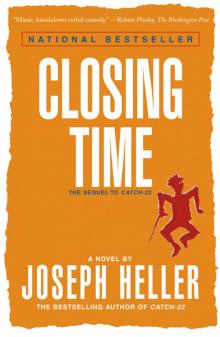- Home
- Joseph Heller
Something Happened Page 2
Something Happened Read online
Page 2
Mrs. Yerger bullied us all. In a little while, nearly all of the file clerks quit, a few of the older ones to go into the army or navy, the rest of us for better jobs. I left for a better job that turned out to be worse. It took nerve to give notice I was quitting, and it always has. (I rehearsed my resignation speech for days, building up the courage to deliver it, and formulated earnest, self-righteous answers to accusing questions about my reasons for leaving that neither Mrs. Yerger nor anyone else even bothered to ask.) I have this thing about authority, about walking right up to it and looking it squarely in the eye, about speaking right out to it bravely and defiantly, even when I know I am right and safe. (I can never make myself believe I am safe.) I just don't trust it.
That was my first job after graduating (or being graduated from) high school. I was seventeen then--that "older," witty, flirting girl under the Western Union clock, Virginia, was only twenty-one (too young now by at least a year or two, even for me)--and in every job I've had since, I've always been afraid I was about to be fired. Actually, I have never been fired from a job; instead, I receive generous raises and rapid promotions, because I am usually very alert (at the beginning) and grasp things quickly. But this feeling of failure, this depressing sense of imminent catastrophe and public shame, persists even here, where I do good work steadily and try to make no enemies. It's just that I find it impossible to know exactly what is going on behind the closed doors of all the offices on all the floors occupied by all the people in this and all the other companies in the whole world who might say or do something, intentionally or circumstantially, that could bring me to ruin. I even torture myself at times with the ominous speculation that the CIA, FBI, or Internal Revenue Service has been investigating me surreptitiously for years and is about to close in and arrest me, for no other reason than that I have some secret liberal sympathies and usually vote Democratic.
I have a feeling that someone nearby is soon going to find out something about me that will mean the end, although I can't imagine what that something is.
In the normal course of a business day, I fear Green and Green fears me. I am afraid of Jack Green because my department is part of his department and Jack Green is my boss; Green is afraid of me because most of the work in my department is done for the Sales Department, which is more important than his department, and I am much closer to Andy Kagle and the other people in the Sales Department than he is.
Green distrusts me fitfully. He makes it clear to me every now and then that he wishes to see everything coming out of my department before it is shown to other departments. I know he does not really mean this: he is too busy with his own work to pay that much attention to all of mine, and I will bypass him on most of our assignments rather than take up his time and delay their delivery to people who have (or think they have) an immediate need for them. Most of the work we do in my department is, in the long run, trivial. But Green always grows alarmed when someone from another department praises something that has come from my department. He turns scarlet with rage and embarrassment if he has not seen or heard of it. (He is no less splenetic if he has seen it and fails to remember it.) The men in the Sales Department like me (or pretend to). They don't like Green. He knows this. They complain about him to me and make uncomplimentary remarks, and he knows this too. He pretends he doesn't. He feigns indifference, since he doesn't really like the men in the Sales Department. I don't really like them, either (but I pretend I do). Generally, Green makes no effort to get along with the men in the Sales Department and is pointedly aloof and disdainful. He worries, though, about the enmity he creates there. Green worries painfully that someday soon the Corporate-Operations Department will take my department away from his department and give it to the Sales Department. Green has been worrying about this for eighteen years.
In my department, there are six people who are afraid of me, and one small secretary who is afraid of all of us. I have one other person working for me who is not afraid of anyone, not even me, and I would fire him quickly, but I'm afraid of him.
The thought occurs to me often that there must be mail clerks, office boys and girls, stock boys, messengers, and assistants of all kinds and ages who are afraid of everyone in the company; and there in one typist in our department who is going crazy slowly and has all of us afraid of her.
Her name is Martha. Our biggest fear is that she will go crazy on a weekday between nine and five. We hope she'll go crazy on a weekend, when we aren't with her. We should get her out of the company now, while there is still time. But we won't. Somebody should fire her; nobody will. Even Green, who actually enjoys firing people, recoils from the responsibility of making the move that might bring about her shattering collapse, although he cannot stand her, detests the way she looks, and is infuriated by every reminder that she still exists in his department. (It was he who hired her after a cursory interview, on a strong recommendation of the woman in the Personnel Department who is in charge of finding typists and sending them up.) Like the rest of us, he tries to pretend she isn't there.
We watch her and wait, and pussyfoot past, and wonder to ourselves how much more time must elapse before she comes on schedule to that last, decisive second in which she finally does go insane--shrieking or numb, clawing wildly or serene, comprehending intelligently that she has now gone mad and must therefore be taken away, or terrified, ignorant, and confused.
Oddly, she is much happier at her job than the rest of us. Her mind wanders from her work to more satisfying places, and she smiles and whispers contentedly to herself as she gazes out over her typewriter roller at the blank wall only a foot or two in front of her face, forgetting what or where she is and the page she is supposed to be copying. We walk away from her if we can, or turn our backs and try not to notice. We each hope somebody else will do or say something to make her stop smiling and chatting to herself each time she starts. When we cannot, in all decency, delay any longer doing it ourselves, we bring her back to our office and her work with gentle reminders that contain no implication of criticism or reproach. We feel she would be surprised and distraught if she knew what she was doing and that she was probably going mad. Other times she is unbearably nervous, unbearable to watch and be with. Everyone is very careful with her and very considerate. Green has complained about her often to the head of Personnel, who does not want to fire her either and has contacted her family in Iowa. Her mother has married again and doesn't want her back. Martha has bad skin. Everyone resents her and wishes she would go away.
The company is benevolent. The people, for the most part, are nice, and the atmosphere, for the most part, is convivial. The decor of the offices, particularly in the reception rooms and anterooms, is bright and colorful. There is lots of orange and lots of sea green. There are lots of office parties. We get all legal holidays off and take three days off with pay whenever we need them. We have many three-and four-day weekends. (I can't face these long weekends anymore and don't know how I survive them. I may have to take up skiing.) Every two weeks we are paid with machine-processed checks manufactured out of stiff paper (they are not thick enough to be called cardboard) that are patterned precisely with neat, rectangular holes and words of formal, official warning in small, black, block letters that the checks must not be spindled, torn, defaced, stapled, or mutilated in any other way. (They must only be cashed.) If not for these words, it would never occur to me to do anything else with my check but deposit it. Now, though, I am occasionally intrigued. What would happen, I speculate gloomily every two weeks or so as I tear open the blank, buff pay envelope and stare dully at the holes and numbers and words on my punched-card paycheck as though hoping disappointedly for some large, unrectifiable mistake in my favor, if I did spindle, fold, tear, deface, staple, and mutilate it? (It's my paycheck, isn't it? Or is it?) What would happen if, deliberately, calmly, with malice aforethought and obvious premeditation, I disobeyed?
I know what would happen: nothing. Nothing would happen. And the knowledge depresses me. So
me girl downstairs I never saw before (probably with a bad skin also) would simply touch a few keys on some kind of steel key punch that would set things right again, and it would be as though I had not disobeyed at all. My act of rebellion would be absorbed like rain on an ocean and leave no trace. I would not cause a ripple.
I suppose it is just about impossible for someone like me to rebel anymore and produce any kind of lasting effect I have lost the power to upset things that I had as a child; I can no longer change my environment or even disturb it seriously. They would simply fire and forget me as soon as I tried. They would file me away. That's what will happen to Martha the typist when she finally goes crazy. She'll be fired and forgotten. She'll be filed away. She'll be given sick pay, vacation pay, and severance pay. She'll be given money from the pension fund and money from the profit-sharing fund, and then all traces of her will be hidden safely out of sight inside some old green cabinet for dead records in another room on another floor or in a dusty warehouse somewhere that nobody visits more than once or twice a year and few people in the company even know exists; not unlike the old green cabinets of dead records in all those accident folders in the storage room on the floor below the main offices of the automobile casualty insurance company for which I used to work when I was just a kid. When she goes crazy, her case will be closed.
I had never imagined so many dead records as I saw in that storage room (and there were thousands and thousands of even deader records at the warehouse I had to go to once or twice a year when a question arose concerning a record that had been dead a really long time). I remember them accurately, I remember the garish look of the data in grotesquely blue ink on the outside of each folder: a number, a name, an address, a date, and an abbreviated indication of whether the accident involved damage to property only (PD) or damage to people (PI, for personal injury). Often, I would bring sandwiches from home (baloney, cooked chopped meat with lots of ketchup, or tuna fish or canned salmon and tomato) and eat them in the storage room downstairs on my lunch hour, and if I ate there alone, I would read the New York Mirror (a newspaper now also dead) and then try to entertain myself by going through some old accident folders picked from the file cabinets at random. I was searching for action, tragedy, the high drama of detective work and courtroom suspense, but it was no use. They were dead. None of the names or appraisals or medical statements or investigations or eyewitness reports brought anything back to life. (The Mirror was better, and even its up-to-the-minute true stories of family and national misfortunes read just like the comic strips.) What impressed me most was the sheer immensity of all those dead records, the abounding quantity of all those drab old sagging cardboard file cabinets rising like joined, ageless towers from the floor almost to the ceiling, that vast, unending sequence of unconnected accidents that had been happening to people and cars long before I came to work there, were happening then, and are happening still.
There was a girl in that company too who went crazy while I was there. She was filed away. And in the company I worked for before this one, there was a man, a middle-minor executive, who went crazy and jumped out of a hotel window and killed himself; he left a note saying he was sorry he was jumping out of the hotel window and killing himself, that he would have shot himself instead but didn't know how to obtain a gun or use one. He was picked up off the ground by the police (probably) and filed away.
I think that maybe in every company today there is always at least one person who is going crazy slowly.
The company is having another banner year. It continues to grow, and in many respects we are the leader in the field. According to our latest Annual Report, it is bigger and better this year than it was last year.
We have twenty-nine offices now, twelve in this country, two in Canada, four in Latin America, and eleven overseas. We used to have one in Cuba, but that was lost. We average three suicides a year; two men, usually on the middle-executive level, kill themselves every twelve months, almost always by gunshot, and one girl, usually unmarried, separated, or divorced, who generally does the job with sleeping pills. Salaries are high, vacations are long.
People in the company like to live well and are unusually susceptible to nervous breakdowns. They have good tastes and enjoy high standards of living. We are well-educated and far above average in abilities and intelligence. Everybody spends. Nobody saves. Nervous breakdowns are more difficult to keep track of than suicides because they are harder to recognize and easier to hush up. (A suicide, after all, is a suicide: there's something final about it. It's the last thing a person does. But who knows with certainty when a person is breaking down?) But nervous breakdowns do occur regularly in all age and occupational groups and among all kinds of people--thin people and fat people, tall people and short people, good people and bad people. In the few years I have been in charge of my department, one girl and one man here have each been out for extended absences because they broke down. Both have been fixed and are now back working for me, and not many people outside my department know why they were gone. (One of them, the man, hasn't been fixed too well, I think, and will probably break down again soon. He is already turning into a problem again, with me and with everyone else he talks to. He talks too much.) In an average year, four people I know about in the company will die of natural causes and two-and-a-half more (two men one year, three the next) will go on sick leave for ailments that will eventually turn out to be cancer. Approximately two people will be killed in accidents every year, one in an auto, the other by fire or drowning. Nobody in the company has yet been killed in an airplane crash, and this is highly mysterious to me, for we travel a lot by air to visit other offices or call on customers, prospects, and suppliers in other cities and countries. When regular, full-time employees do go on sick leave, they are usually paid their full salary for as long as the illness lasts (even though it may last a lifetime. Ha, ha), for the company excels in this matter of employee benefits. Everybody is divorced (not me, though). Everyone drinks and takes two hours or more for lunch. The men all flirt. The women all respond, except for a few who are very religious or very dull, or a few very young ones who are out in the world for the first time and don't understand yet how things are.
Most of us like working here, even though we are afraid, and do not long to leave for jobs with other companies. We make money and have fun. We read books and go to plays. And somehow the time passes.
This fiscal period, I am flirting with Jane. Jane is new in the Art Department and not quite sure whether I mean it or not. She is just a few years out of college, where she majored in fine arts, and still finds things in the city daring, sophisticated, and intellectual. She goes to the movies a lot. She has not, I think, slept with a married man yet.
Jane is assistant head of the Art Department in Green's department. There are only three people in the Art Department. She has, like the rest of us, much time in which to brood and fantasize and make personal phone calls and kid around with whoever in the company (me) wants to kid around with her. She has a tall, slim figure that's pretty good and a clogged duct in one eye that makes it dribble with tears. She wears loose lamb's-wool sweaters that hug the long points of her small breasts beautifully. (Often, my fingertips would love to hug and roll those same long points of her small breasts just as beautifully, but I know from practice that my desire would not remain with her breasts for long. They make a convenient starting place.) Her good figure, prominent nipples, and clogged tear duct give me an easy opening for suggestive wisecracks that cover the same ground as those I used to exchange with that older girl Virginia under the big Western Union clock in the automobile casualty insurance company (the company is still in business after all these years, at the same place, and probably the clock too is still there, running, although the office building is now slated to come down), except that now I am the older, more experienced (and more jaded) one and can control and direct things pretty much the way I choose. I have the feeling now that I can do whatever I want to with Jane, especially
on days when she's had two vodka martinis for lunch instead of one (I, personally, hate vodka martinis and mistrust the mettle of people who drink them) or three whiskey sours instead of two. I could, if I wished, take her out for three vodka martinis after work one day and then up to Red Parker's apartment nearby, and the rest, I'd bet, would be as easy as pie (and possibly no more thrilling). I can make Jane laugh whenever I want to, and this, I know, can be worth more than half the game if I decide I seriously do want to play, but I'm not sure either whether I mean it or not.
Probably, I should be ashamed of myself, because she's only a decent young girl of twenty-four. Possibly I should be proud of myself, because she is, after all, a decent and very attractive young girl of only twenty-four whom I can probably lay whenever I want to. (I have her scheduled vaguely somewhere ahead, probably in the weeks before the convention, when I will be using everybody in the Art Department a great deal.) I don't really know how I am supposed to feel. I do know that girls in their early twenties are easy and sweet. (Girls in their late twenties are easier but sad, and that isn't so sweet.) They are easy, I think, because they are sweet, and they are sweet, I think, because they are dumb.

 Catch-22
Catch-22 Something Happened
Something Happened God Knows
God Knows Catch As Catch Can
Catch As Catch Can Closing Time
Closing Time Good as Gold
Good as Gold Almost Like Christmas
Almost Like Christmas